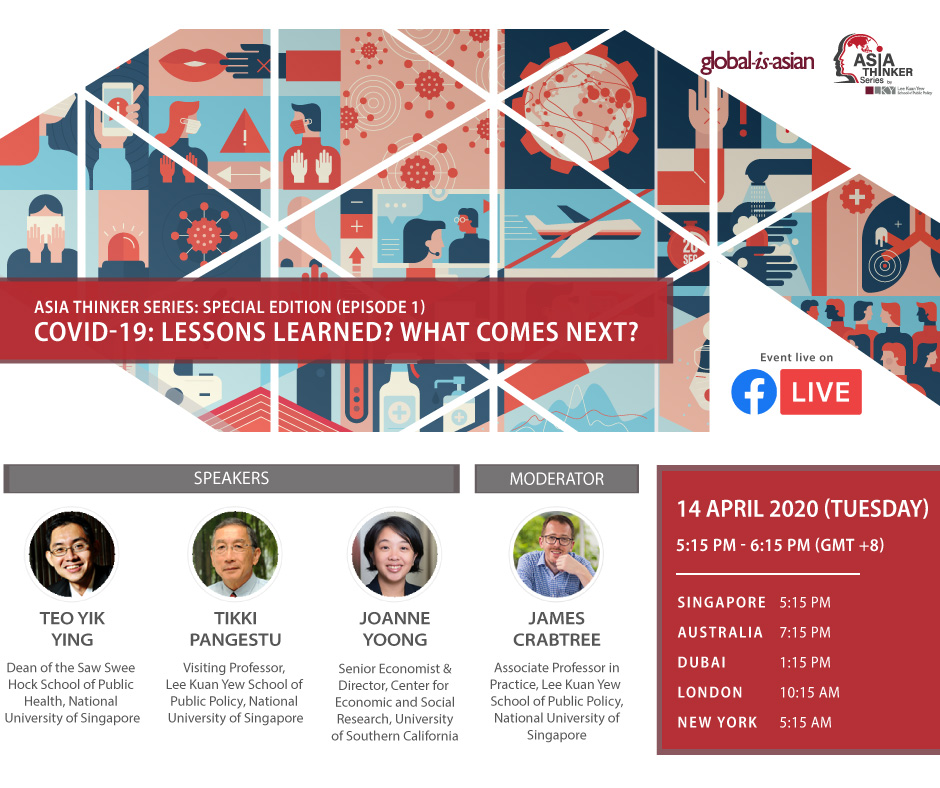With each passing day the economic severity of the coronavirus crisis grows clearer. A global recession is now certain, along with crunching falls in trade.
Ironically, many of the Asian nations that responded most effectively to the pandemic are now likely to be hit hardest by its fallout: it will hasten decoupling between the U.S. and China and accelerate the collapse of the trade-dependent model of globalization upon which so many Asian economies rely.
The pandemic is creating an unusual simultaneous supply and demand shock to the world economy. Early on the former looked most problematic as factory disruptions in China rippled through supply chains.
But as the crisis intensifies the demand shock will matter more. Crunching slowdowns in the U.S., Europe and China will mean a worldwide "recession" this year, a term the International Monetary Fund uses when annual global growth falls below 2.5%. An actual global contraction, meaning negative growth overall, now looks evermore likely.
The big industrial economies already affected account for well over half of world gross domestic product. Economists at Morgan Stanley cut their forecasts for global output again on March 23, predicting a base case of just 0.3% growth and a bear case decline of 2.1%, a sharper fall even than after the 2008 global financial crisis.
The year of 2008 is instructive in other ways. Back then it was a rapid slowdown in U.S. and European demand that caused knock-on contractions, including in Asia. Trade declined faster than growth overall. And while growth bounced back eventually, trade never recovered to precrisis levels. There were permanent reductions in investment flows too.
Similar or worse patterns are now likely. But the deeper damage to globalization will also come from second-order effects, some of them driven by political attempts to accelerate decoupling between the U.S. and China.
Peter Navarro, trade adviser to U.S. President Donald Trump, in late February blamed the depth of the crisis on outsourced supply chains, saying: "We've got to get that back on shore." Bailouts for struggling U.S. companies, from airlines to manufacturers, provide a potential lever, given they could come with conditions forcing partial repatriation of production.
A protectionist surge is likely too. Some of this will flow from the pandemic, for instance export restrictions on medical equipment. But more restrictions will arrive as recessions bite, just as happened after 2008, when controls on food commodity exports caused a spike in global prices.
Perhaps most important of all will be the effect of companies rethinking vulnerabilities. The model of globalization created before 2008 was built bit by bit by companies like Apple and Boeing as they hunted for cheap labor and products. The resulting system is efficient and often run on a just in time basis. But it is also fragile and unstable.
Many international companies find it impossible to judge the risks from improbable but significant disruptions, and therefore barely prepare for them. This was the lesson of Japan's 2011 earthquake-tsunami-nuclear meltdown disaster, which damaged supply chains in industries like electronics. In its aftermath, affected producers did change some sourcing habits, diversifying suppliers or adding contingency facilities, to avoid a recurrence.
This pandemic is clearly many orders of magnitude more severe than Fukushima. Its effect on corporate thinking will be more profound too. Some multinationals will repatriate as Navarro and his ilk demand, moving a portion of their production back to home markets in Europe, Japan or the U.S., or perhaps to markets close to them, like Mexico or Poland.
More likely is a shift to diversify regionally, or to invest more in capital equipment and robotics to reduce demand for inexpensive Asian labor.
The result will damage the multinational production networks trade economists like to call "global value chains," which account for roughly three-quarters of all global trade. Their growth stagnated after the financial crisis, bringing a halt to what management consultants McKinsey & Co call the "fragmentation" of international production into ever more intricate parts. Now they are likely to go into full decline.
This will accelerate decoupling away from China in particular. Despite much talk of deglobalisation over recent years, trade-intensive sectors like automotive, electronics and industrial machinery have only barely begun to shift production patterns. Companies like Apple in particular have moved just a tiny fraction of their Chinese businesses. As they pick themselves up after this crisis, many more will do so.
That does not mean globalization will collapse. The coming crisis will accelerate other changes already under way, boosting digital trade for instance, or potentially curbing travel patterns as workers learn to organize and produce remotely. Some of these changes will create international supply chains that are less complex, albeit less efficient, more environmentally sustainable and more resilient to shocks.
But the net effect will still be to unpick a global system of commerce built up over recent decades, with China at its heart, harming trade-dependent Asian economies in particular. The 2008 financial crisis stopped globalization in its tracks. The coronavirus crisis of 2020 will send it into reverse.
An employee wearing a face mask works in a factory of printed circuit boards in Suining, China on Feb. 1: the coming crisis will accelerate other changes already under way. (Photo credit: FeatureChina/AP)
This article was first published in Nikkei Asian Review on 25 March 2020.
Learn more in a new series of online discussions on the global pandemic as part of the Lee Kuan Yew School's "Asia Thinker Series”, bringing together a distinguished virtual panel of experts to examine public health lessons from the ongoing crisis, while looking forward to how to manage its next stages.
To view and participate in the Asia Thinker Series, please visit the following link and click on “Get Reminder” to receive a Facebook notification to tune in to the live stream before it starts:https://lkyspp.sg/34gNcMk
